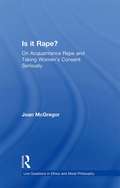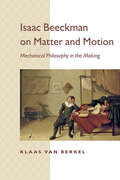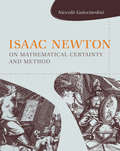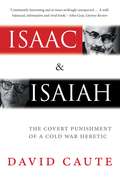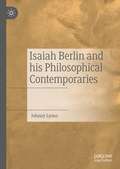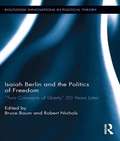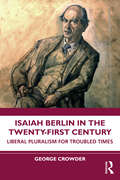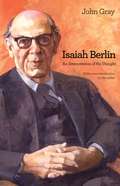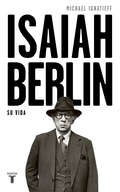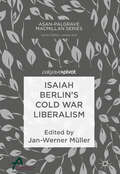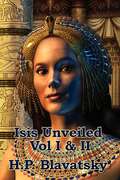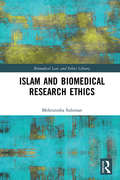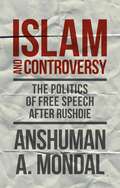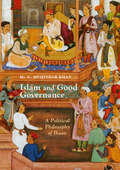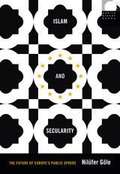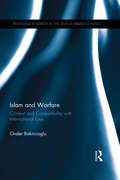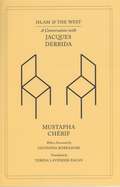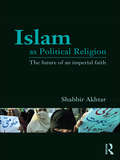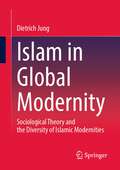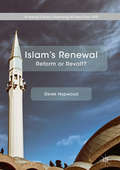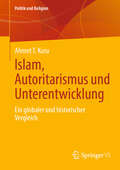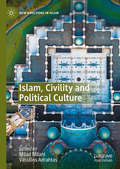- Table View
- List View
Is it Rape?: On Acquaintance Rape and Taking Women's Consent Seriously (Live Questions in Ethics and Moral Philosophy)
by Joan McGregorThe issue of acquaintance rape has been gaining increased prominence in recent years. In this book Joan McGregor analyses the ethical and legal problems that arise in connection with acquaintance rape cases. She discusses with great clarity and precision the complexities involved in notions such as consent, force, autonomy, power, intention and the impairment of responsibility through drugs, alcohol and mental illness. Arguing that criminal rape laws are too narrow, capturing only cases where there is clearly recognized physical violence and resistance from the victim, she sets out a new proposal for how the criminal law should deal with cases of nonconsensual sex which captures the ideals of a liberal political society and in particular the idea of equality. This book explains fully what it means when a woman says no and means no.
Isaac Beeckman on Matter and Motion: Mechanical Philosophy in the Making
by Klaas van BerkelExplore the work of a founding father of the mechanical philosophy of nature, Isaac Beeckman (1588–1637).The contribution of the Dutch craftsman and scholar Isaac Beeckman to early modern scientific thought has never been properly acknowledged. Surprisingly free from the constraints of traditional natural philosophy, he developed a view of the world in which everything, from the motion of the heavens to musical harmonies, is explained by reducing it to matter in motion. His ideas deeply influenced Descartes and Gassendi. Klaas van Berkel has succeeded in unearthing and explicating Beeckman's scientific notebooks, allowing us to follow how he developed his new philosophy, almost day by day.Beeckman was almost forgotten until the discovery of his notebooks in the early twentieth century. Isaac Beeckman on Matter and Motion is the first full-length study of the ideas and motives of this remarkable figure. Van Berkel's important study first relates Beeckman's life, placing him in the religious, intellectual, educational, and social context of the Dutch Republic in its golden age. Van Berkel then analyzes the notebooks themselves and the nature and development of Beeckman's "mechanical philosophy." He demonstrates how Beeckman's artisanal background and religious convictions shaped his natural philosophy, even as the decisive influence stems from the educational philosophy of the sixteenth-century French philosopher Peter Ramus. Historians of science and the philosophy of science will find the substance of Beeckman's thought and the unraveling of its growth and development highly interesting. Van Berkel's account provides a new and comprehensive interpretation of the origins of the mechanical philosophy of nature, the philosophy that culminated in the work of Isaac Newton.
Isaac Newton
by Andrew Janiak Isaac NewtonSir Isaac Newton (1642-1727) left a voluminous legacy of writings. Despite his influence on the early modern period, his correspondence, manuscripts, and publications in natural philosophy remain scattered throughout many disparate editions. In this volume, Newton's principal philosophical writings are for the first time collected in a single place. They include excerpts from the Principia and the Opticks, his famous correspondence with Boyle and with Bentley, and his equally significant correspondence with Leibniz, which is often ignored in favor of Leibniz's later debate with Samuel Clarke. Newton's exchanges with Leibniz place their different understandings of natural philosophy in sharp relief. The volume also includes 'De Gravitatione', offered here in a corrected translation, which is crucial for understanding Newton's relation to his great predecessor Descartes. In a historical and philosophical introduction, Andrew Janiak examines Newton's philosophical positions and his relations to canonical figures in early modern philosophy.
Isaac Newton on Mathematical Certainty and Method (Transformations: Studies in the History of Science and Technology)
by Niccolo GuicciardiniAn analysis of Newton's mathematical work, from early discoveries to mature reflections, and a discussion of Newton's views on the role and nature of mathematics.Historians of mathematics have devoted considerable attention to Isaac Newton's work on algebra, series, fluxions, quadratures, and geometry. In Isaac Newton on Mathematical Certainty and Method, Niccolò Guicciardini examines a critical aspect of Newton's work that has not been tightly connected to Newton's actual practice: his philosophy of mathematics. Newton aimed to inject certainty into natural philosophy by deploying mathematical reasoning (titling his main work The Mathematical Principles of Natural Philosophy most probably to highlight a stark contrast to Descartes's Principles of Philosophy). To that end he paid concerted attention to method, particularly in relation to the issue of certainty, participating in contemporary debates on the subject and elaborating his own answers. Guicciardini shows how Newton carefully positioned himself against two giants in the “common” and “new” analysis, Descartes and Leibniz. Although his work was in many ways disconnected from the traditions of Greek geometry, Newton portrayed himself as antiquity's legitimate heir, thereby distancing himself from the moderns. Guicciardini reconstructs Newton's own method by extracting it from his concrete practice and not solely by examining his broader statements about such matters. He examines the full range of Newton's works, from his early treatises on series and fluxions to the late writings, which were produced in direct opposition to Leibniz. The complex interactions between Newton's understanding of method and his mathematical work then reveal themselves through Guicciardini's careful analysis of selected examples. Isaac Newton on Mathematical Certainty and Method uncovers what mathematics was for Newton, and what being a mathematician meant to him.
Isaac and Isaiah
by David CauteRancorous and highly public disagreements between Isaiah Berlin and Isaac Deutscher escalated to the point of cruel betrayal in the mid-1960s, yet surprisingly the details of the episode have escaped historians' scrutiny. In this gripping account of the ideological clash between two of the most influential scholars of Cold War politics, David Caute uncovers a hidden story of passionate beliefs, unresolved antagonism, and the high cost of reprisal to both victim and perpetrator.Though Deutscher (1907-1967) and Berlin (1909-1997) had much in common--each arrived in England in flight from totalitarian violence, quickly mastered English, and found entry into the Anglo-American intellectual world of the 1950s--Berlin became one of the presiding voices of Anglo-American liberalism, while Deutscher remained faithful to his Leninist heritage, resolutely defending Soviet conduct despite his rejection of Stalin's tyranny. Caute combines vivid biographical detail with an acute analysis of the issues that divided these two icons of Cold War politics, and brings to light for the first time the full severity of Berlin's action against Deutscher.
Isaiah Berlin
by Arie M. DubnovThis study offers an intellectual biography of the philosopher, political thinker, and historian of ideas Sir Isaiah Berlin. It aims to provide the first historically contextualized monographic study of Berlin's formative years and identify different stages in his intellectual development, allowing a reappraisal of his theory of liberalism.
Isaiah Berlin and his Philosophical Contemporaries
by Johnny LyonsThis book sets out to identify the nature and implications of a proper understanding of pluralism in a original and illuminating way. Isaiah Berlin believed that a recognition of pluralism is vital to a free, decent and civilised society. By looking below at the often neglected foundations of Berlin’s celebrated account of moral pluralism, Lyons reveals the more philosophically profound aspects of his undogmatic and humanistic liberal vision. He achieves this by comparing Berlin’s core ideas with those of several of his most distinguished philosophical contemporaries, an exercise which yields not only a deeper grasp of Berlin and several major twentieth-century thinkers, principally A. J. Ayer, J. L. Austin, P. F. Strawson, Bernard Williams and Quentin Skinner, but, more broadly, a keener appreciation of the power of history and philosophy to help us make sense of our predicament.
Isaiah Berlin and the Politics of Freedom: ‘Two Concepts of Liberty’ 50 Years Later (Routledge Innovations in Political Theory)
by Bruce Baum Robert NicholsSince his death in 1997, Isaiah Berlin’s writings have generated continual interest among scholars and educated readers, especially in regard to his ideas about liberalism, value pluralism, and "positive" and "negative" liberty. Most books on Berlin have examined his general political theory, but this volume uses a contemporary perspective to focus specifically on his ideas about freedom and liberty. Isaiah Berlin and the Politics of Freedom brings together an integrated collection of essays by noted and emerging political theorists that commemorate in a critical spirit the recent 50th anniversary of Isaiah Berlin’s famous lecture and essay, "Two Concepts of Liberty." The contributors use Berlin’s essay as an occasion to rethink the larger politics of freedom from a twenty-first century standpoint, bringing Berlin’s ideas into conversation with current political problems and perspectives rooted in postcolonial theory, feminist theory, democratic theory, and critical social theory. The editors begin by surveying the influence of Berlin’s essay and the range of debates about freedom that it has inspired. Contributors’ chapters then offer various analyses such as competing ways to contextualize Berlin’s essay, how to reconsider Berlin’s ideas in light of struggles over national self-determination, European colonialism, and racism, and how to view Berlin’s controversial distinction between so-called "negative liberty" and "positive liberty." By relating Berlin’s thinking about freedom to competing contemporary views of the politics of freedom, this book will be significant for both scholars of Berlin as well as people who are interested in larger debates about the meaning and conditions of freedom.
Isaiah Berlin in the Twenty-First Century: Liberal Pluralism for Troubled Times
by George CrowderIsaiah Berlin is well known as a defender of liberal democracy in the Cold War. In this path-breaking study, George Crowder argues that Berlin’s ideas have application beyond their original context to the problems of our own time.Focusing on three central themes – liberty, identity, and value pluralism – Crowder presents a fresh interpretation of Berlin, exposing the misunderstandings of critics, especially those who ignore Berlin’s pluralist foundation. Although genuine problems remain, these can be alleviated by revising and extending Berlin’s view to construct an updated liberal pluralism. Together with Berlin’s own arguments, liberal pluralism is then brought to bear on a range of current concerns, including neoliberalism, identity politics, populism, international relations, religion, feminism, climate change, and global pandemics. The resulting outlook is complex, realistic, humane, and positive.Isaiah Berlin in the Twenty-First Century represents a new departure in the study of Berlin, value pluralism, and liberal thought more generally. It is essential reading for researchers and advanced students in these fields, but its wide range will appeal to anyone interested in the values and politics of our troubled times.
Isaiah Berlin: An Interpretation of His Thought
by John GrayIsaiah Berlin (1909-1997) was the greatest intellectual historian of the twentieth century. But his work also made an original and important contribution to moral and political philosophy and to liberal theory. In 1921, at the age of eleven, Isaiah Berlin arrived in England from Riga, Latvia. By the time he was thirty he was at the heart of British intellectual life. He has remained its commanding presence ever since, and few would dispute that he was one of Britain's greatest thinkers. His reputation extends worldwide--as a great conversationalist, intellectual historian, and man of letters. He has been called the century's most inspired reader. Yet Berlin's contributions to thought--in particular to moral and political philosophy, and to liberal theory--are little understood, and surprisingly neglected by the academic world. In this book, they are shown to be animated by a single, powerful, subversive idea: value-pluralism which affirms the reality of a deep conflict between ultimate human values that reason cannot resolve. Though bracingly clear-headed, humane and realist, Berlin's value-pluralism runs against the dominant Western traditions, secular and religious, which avow an ultimate harmony of values. It supports a highly distinctive restatement of liberalism in Berlin's work--an agnostic liberalism, which is founded not on rational choice but on the radical choices we make when faced with intractable dilemmas. It is this new statement of liberalism, the central subject of John Gray's lively and lucid book, which gives the liberal intellectual tradition a new lease on life, a new source of life, and which comprises Berlin's central and enduring legacy. In a new introduction, Gray argues that, in a world in which human freedom has spread more slowly than democracy, Berlin's account of liberty and basic decency is more instructive and useful than ever.
Isaiah Berlin: Una biografía
by Michael IgnatieffIsaiah Berlin. Una biografía es una de esas raras biografías en las que la fuerza del personaje está por encima de su propia obra. Isaiah Berlin nunca quiso escribir su autobiografía -«No me considero un tema de reflexión lo suficientemente importante o interesante»-, dijo en una ocasión. Pero para muchos era justamente lo contrario: no solo era uno de los principales filósofos liberales de este siglo, sino que su propia vida fue una vívida y apasionante crónica de nuestro tiempo. Michael Ignatieff ha recogido en este libro la primera biografía autorizada de Berlin, fruto de las conversaciones que mantuvieron durante la última década de su vida. Un trabajo de admirable identificación con su protagonista, donde el lector percibe todo el sentido del humor de Berlin y recupera, como viviéndolos, los recuerdos del maestro. Sus encuentros con Virginia Woolf y Wittgenstein, sus momentos de inspiración y de duda, su talento para gozar de la vida.
Isaiah Berlin’s Cold War Liberalism (Asan-Palgrave Macmillan Series)
by Jan-Werner MüllerThis book offers a succinct re-examination of Berlin’s Cold War liberalism, at a time when many observers worry about the emergence of a new Cold War. Two chapters look closely at Berlin’s liberalism in a Cold War context, one carefully analyses whether Berlin was offering a universal political theory – and argues that he did indeed (already at the time of the Cold War there were worries that Berlin was a kind of relativist). It will be of value for scholars of the cold war and of security issues in contemporary Asia, as well as students of history and philosophy.
Isis Unveiled: Vol. I & II
by H. P. BlavatskyIsis Unveiled is a master key to the mysteries of ancient and modern science and theology. With the help of this book you will be able to make sense of how so many of the world's peaceful and beautiful religions have been changed by those in charge of said religions. H. P. Blavatsky's knowledge of religious minutia is immense and her assertions will challenge the way you look at the world. She slices through one religious agenda after another in search of truth. No religion is safe and no beliefs go unchallenged. Now you can have both volumes of this esoteric masterpiece in one binding.
Islam
by Fazlur RahmanPUBLISHER'S NOTE In dating, Muslims naturally use their own era, dating from the Hijra or flight of the Prophet Muhammad to Medina in 622 ad, sometimes called Anno Hegirae. Since the Muslim year is lunar it is impracticable to convert dates from the Muslim to the Christian era, and vice versa, by a simple formula. The publishers have therefore decided to give all dates-except for a few in the present century-in the Muslim style as well as in the familiar Gregorian calendar; this style of dating is in conformity with modern scholarly practice in the Islamic field. The Muslim date is always given first, the Gregorian date following after an oblique stroke: thus, 287/900, 787/1385, 1287/1870-1, etc. Occasionally a Muslim year will fall entirely within one Christian solar year, but usually there will be some overlapping between the years of the two eras. The same system is also applied to centuries: 8th/14th century, early 12th/late 17th century, etc.
Islam and Biomedical Research Ethics (Biomedical Law and Ethics Library)
by Mehrunisha SulemanThis book is a contribution to the nascent discourse on global health and biomedical research ethics involving Muslim populations and Islamic contexts. It presents a rich sociological account about the ways in which debates and questions involving Islam within the biomedical research context are negotiated - a perspective which is currently lacking within the broader bioethics literature. The book tackles some key understudied areas including: role of faith in moral deliberations within biomedical research ethics, the moral anxiety and frustration experienced by researchers when having to negotiate multiple moral sources and how the marginalisation of women, the prejudice and abuse faced by groups such as sex workers and those from the LGBT community are encountered and negotiated in such contexts. The volume provides a valuable resource for researchers and scholars in this area by providing a systematic review of ethical guidelines and a rich case-based account of the ethical issues emerging in biomedical research in contexts where Islam and the religious moral commitments of Muslims are pertinent. The book will be essential for those conducting research in low and middle income countries that have significant Muslim populations and for those in Muslim-minority settings. It will also appeal to researchers and scholars in religious studies, social sciences, philosophy, anthropology and theology, as well as the fields of biomedical ethics, Islamic ethics and global health..
Islam and Controversy
by Anshuman A. MondalWas Salman Rushdie right to have written The Satanic Verses? Were the protestors right to have protested? What about the Danish cartoons? This important book examines the moral questions raised by cultural controversies, and how intercultural dialogue might be generated within multicultural societies.
Islam and Good Governance: A Political Philosophy of Ihsan
by M. A. KhanThis book advances an Islamic political philosophy based on the concept of Ihsan, which means to do beautiful things. The author moves beyond the dominant model of Islamic governance advanced by modern day Islamists. The political philosophy of Ihsan privileges process over structure, deeds over identity, love over law and mercy and forgiveness over retribution. The work invites Muslims to move away from thinking about the form of Islamic government and to strive to create a self-critical society that defends national virtue and generates institutions and practices that provide good governance.
Islam and Secularity: The Future of Europe's Public Sphere
by Nilüfer GöleIn Islam and Secularity Nilüfer Göle takes on two pressing issues: the transforming relationship between Islam and Western secular modernity and the impact of the Muslim presence in Europe. Göle shows how the visibility of Islamic practice in the European public sphere unsettles narratives of Western secularism. As mutually constitutive, Islam and secularism permeate each other, the effects of which play out in embodied and aesthetic practices and are accompanied by fear, anxiety, and violence. In this timely book, Göle illuminates the recent rethinking of secularism and religion, of modernity and resistance to it, of the public significance of sexuality, and of the shifting terrain of identity in contemporary Europe.
Islam and Warfare: Context and Compatibility with International Law (Routledge Research in the Law of Armed Conflict)
by Onder BakirciogluThe question of how Islamic law regulates the notions of just recourse to and just conduct in war has long been the topic of heated controversy, and is often subject to oversimplification in scholarship and journalism. This book traces the rationale for aggression within the Islamic tradition, and assesses the meaning and evolution of the contentious concept of jihad. The book reveals that there has never been a unified position on what Islamic warfare tangibly entails, due to the complexity of relevant sources and discordant historical dynamics that have shaped the contours of jihad. Onder Bakircioglu advocates a dynamic reading of Islamic law and military tradition; one which prioritises the demands of contemporary international relations and considers the meaning and application of jihad as contingent on the socio-political forces of each historical epoch. This book will be of great interest to scholars and students of international law, Islamic law, war and security studies, and the law of armed conflict.
Islam and the West: A Conversation with Jacques Derrida
by Mustapha Cherif Teresa Lavender FaganIn the spring of 2003, Jacques Derrida sat down for a public debate in Paris with Algerian intellectual Mustapha Chérif. The eminent philosopher arrived at the event directly from the hospital where he had just been diagnosed with pancreatic cancer, the illness that would take his life just over a year later. That he still participated in the exchange testifies to the magnitude of the subject at hand: the increasingly distressed relationship between "Islam and the West", and the questions of freedom, justice, and democracy that surround it. As Chérif relates in this account of their dialogue, the topic of Islam held special resonance for Derrida -- perhaps it is to be expected that near the end of his life his thoughts would return to Algeria, the country where he was born in 1930. Indeed, these roots served as the impetus for their conversation, which first centers on the ways in which Derrida's Algerian-Jewish identity has shaped his thinking. From there, the two men move to broader questions of secularism and democracy; to politics and religion and how the former manipulates the latter; and to the parallels between xenophobia in the West and fanaticism among Islamists. Ultimately, the discussion is an attempt to tear down the notion that Islam and the West are two civilizations locked in a bitter struggle for supremacy and to reconsider them as the two shores of the Mediterranean -- two halves of the same geographical, religious, and cultural sphere.
Islam as Political Religion: The Future of an Imperial Faith
by Shabbir AkhtarThis comprehensive survey of contemporary Islam provides a philosophical and theological approach to the issues faced by Muslims and the question of global secularisation. Engaging with critics of modern Islam, Shabbir Akhtar sets out an agenda of what his religion is and could be as a political entity. Exploring the views and arguments of philosophical, religious and political thinkers, the author covers a raft of issues faced by Muslims in an increasingly secular society. Chapters are devoted to the Qur’an and Islamic literature; the history of Islam; Sharia law; political Islam; Islamic ethics; and political Islam’s evolving relationship with the West. Recommending changes which enable Muslims to move from their imperial past to a modest role in the power structures of today’s society, Akhtar offers a detailed assessment of the limitations and possibilities of Islam in the modern world. Providing a vision for an empowered yet rational Islam that distances itself from both Islamist factions and Western secularism, this book is an essential read for students and scholars of Islamic studies, religion, philosophy and politics.
Islam in Global Modernity: Sociological Theory and the Diversity of Islamic Modernities
by Dietrich JungThis book combines sociological theorising with studies on the Middle East and Islam. The diversity of modernities that can be observed in our world is linked to the claim of living in a global modernity, in a world society. The book underpins this claim with numerous excursions into Islamic history. It criticises the view that modernisation can be equated with westernisation and considers different projects of specifically Islamic modernities as integral parts of world society. From this perspective, the study contributes to the "provincialisation" of European history in contemporary social scientific thought. Contrary to the theories of postcolonialism associated with the call for the provincialisation of Europe, however, this book adheres to essential traditions of classical sociology. It thus aims to make a contribution to the social theoretical discussion on modernity, which is empirically underpinned with the help of data from the history of the Middle East and Islam.
Islam's Renewal: Reform Or Revolt? (St Antony's)
by Derek HopwoodThe book considers some of the solutions proposed by Muslim activists and thinkers in their attempts to renew (tajdid) their ways of life and thought in accord with the demands of the age in which they lived. The two ways of reacting are studied – the movements led by men of action and inspiration, and the thoughts of quietist scholars who laid greater emphasis on calm continuity. These two streams have often collided and particularly so in the contemporary age of greater violence. Other related problems are also considered: how a non-Muslim should regard the religion of the ‘other’; the ways modernization have been dealt with; and the two root causes of Muslim ‘rage’ today – the invasions of the West and the failure to reach an equitable solution to the problem of Palestine. Building on the author’s sixty-year experience researching the history of Islam, the book will appeal to students and scholars across the fields of Islamic studies, religious history and Middle Eastern politics.
Islam, Autoritarismus und Unterentwicklung: Ein globaler und historischer Vergleich (Politik und Religion)
by Ahmet T. KuruWarum weisen Länder mit muslimischer Bevölkerungsmehrheit im Vergleich zum Weltdurchschnitt ein niedriges Maß an Demokratie und sozioökonomischer Entwicklung auf? Dieses Buch kritisiert Erklärungen, die den Islam als Ursache dieser Ungleichheit anführen, da die Muslime zwischen dem 9. und 12. Jahrhundert philosophisch und sozioökonomisch weiter fortgeschritten waren als die Westeuropäer. Auch der westliche Kolonialismus war nicht die Ursache: Die Muslime litten bereits unter politischen und sozioökonomischen Problemen, als die Kolonisierung begann. Dieses Buch argumentiert, dass die Muslime in ihrer frühen Geschichte, als in Europa religiöse Orthodoxie und Militärherrschaft vorherrschten, einflussreiche Denker und Kaufleute hatten. Im 11. Jahrhundert entstand jedoch ein Bündnis zwischen orthodoxen islamischen Gelehrten (den Ulema) und Militärstaaten. Dieses Bündnis erstickte allmählich die intellektuelle und wirtschaftliche Kreativität, indem es die intellektuellen und bürgerlichen Klassen in der muslimischen Welt marginalisierte. Dieses Bündnis behindert auch heute noch Kreativität und Wettbewerb in muslimischen Ländern. Die Rohfassung der deutschen Übersetzung hat ein maschinelles Übersetzungsprogramm mit Hilfe künstlicher Intelligenz angefertigt. Eine anschließende menschliche Überarbeitung erfolgte vor allem in inhaltlicher Hinsicht, so dass sich das Buch stilistisch anders lesen wird als eine herkömmliche Übersetzung.
Islam, Civility and Political Culture (New Directions in Islam)
by Milad Milani Vassilios AdrahtasThis book provides a comprehensive and interdisciplinary exploration of civility and political culture in the Muslim world.The contributions consider the changing interface between religion and politics throughout Islamic history, and into the present. Extending beyond saturated approaches of ‘political’ and/or ‘militant’ Islam, this collection captures the complex sociopolitical character of Islam, and identifies tensions between the political-secular and the sacred-religious in contemporary Muslim life. The alternative conceptual framework to traditional analyses of secularisation and civility presented across this volume will be of interest to students and scholars across Islamic studies, religious studies, sociology and political science, civilisation studies, and cultural studies.
